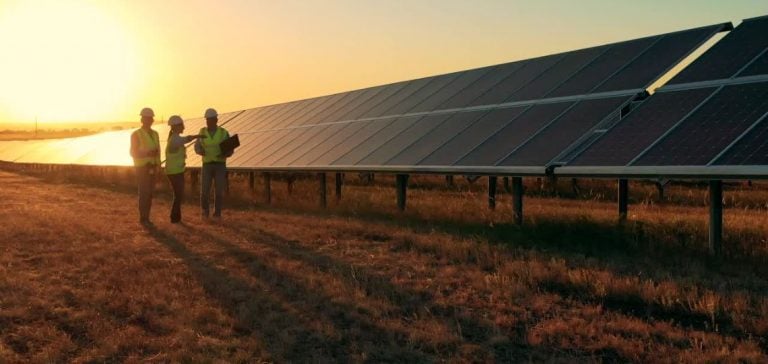Gensol Engineering Limited, an Indian company specializing in sustainable energy solutions, announced that it has been awarded a contract valued at AED 81.6 million by the United Arab Emirates. This contract involves the design, construction, and long-term operation of photovoltaic (PV) systems on the rooftops of facilities belonging to a major aviation company based in Dubai.
The project, with a total installed capacity of 23,178 kWp (23 MWp), demonstrates Gensol Engineering’s commitment to promoting renewable energies in the Middle East. By participating in this initiative, the company significantly contributes to the region’s transition towards cleaner and more sustainable energy sources.
Scope and Objectives of the Project
The contract, which spans a 20-month period, includes all phases of the project, from initial design to long-term maintenance of the solar systems. Gensol Engineering will be responsible for supplying the necessary materials, constructing the installations, as well as testing and commissioning the photovoltaic systems.
These solar installations will provide a sustainable energy solution to the client aviation company, thereby contributing to Dubai’s ambitious sustainability goals. By reducing the carbon footprint of one of the region’s most critical industrial facilities, this project fits perfectly into Dubai’s strategy to become a global leader in clean energy by 2050.
Impact on the Energy Transition in the Middle East
The realization of this project by Gensol Engineering underscores the growing importance of international partnerships in the renewable energy sector. By collaborating with a sustainable development company from the United Arab Emirates, Gensol Engineering strengthens its presence in the Middle Eastern market and demonstrates its ability to provide innovative and efficient energy solutions.
Kapil K Nirmal, CEO – Solar EPC (MENA) at Gensol Engineering Ltd., stated: “We are thrilled to partner with UAE’s leading sustainable development company on this landmark project, which reflects our ongoing commitment to delivering innovative and efficient solar EPC solutions in this region.”
Technology and Sustainability
The photovoltaic systems installed under this contract will utilize the latest solar energy technologies, ensuring maximum efficiency and increased durability. Gensol Engineering will ensure that each installation is optimized to meet the specific energy needs of the aviation company, while minimizing environmental impact.
This project is also part of a broader trend aimed at integrating more renewable energy sources into industrial infrastructures, thereby contributing to the overall reduction of greenhouse gas emissions in the region.
Future Prospects
With this contract, Gensol Engineering strengthens its position as a key player in the renewable energy sector in the Middle East. The company plans to continue its efforts to establish new partnerships and develop similar projects that support the region’s sustainability and energy transition goals.
This success paves the way for future collaboration opportunities with other companies and organizations seeking to adopt clean and efficient energy solutions.






















